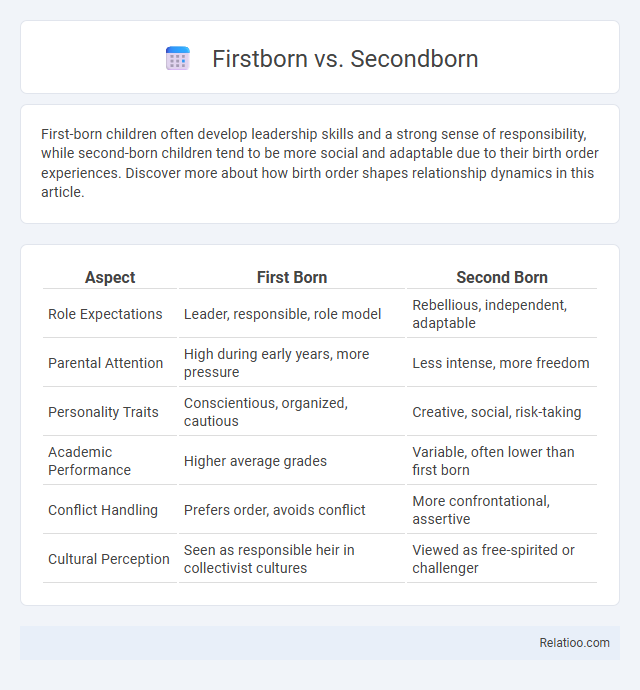First-born children often develop leadership skills and a strong sense of responsibility, while second-born children tend to be more social and adaptable due to their birth order experiences. Discover more about how birth order shapes relationship dynamics in this article.
Table of Comparison
| Aspect | First Born | Second Born |
|---|---|---|
| Role Expectations | Leader, responsible, role model | Rebellious, independent, adaptable |
| Parental Attention | High during early years, more pressure | Less intense, more freedom |
| Personality Traits | Conscientious, organized, cautious | Creative, social, risk-taking |
| Academic Performance | Higher average grades | Variable, often lower than first born |
| Conflict Handling | Prefers order, avoids conflict | More confrontational, assertive |
| Cultural Perception | Seen as responsible heir in collectivist cultures | Viewed as free-spirited or challenger |
Introduction: Understanding Birth Order Dynamics
Birth order significantly influences personality development and family roles, with first born children often showing leadership qualities and responsibility. Second born siblings tend to develop negotiation and social skills as they navigate family dynamics differently than their older siblings. Understanding birth order provides valuable insight into behavioral patterns and interpersonal relationships within families.
Personality Traits of First Born Children
First born children often exhibit leadership qualities, high responsibility, and a strong sense of achievement due to parental expectations and undivided attention during early years. They tend to be conscientious, organized, and achievement-oriented, frequently assuming caretaker roles within sibling dynamics. Studies indicate first borns may display higher levels of intelligence and conformity compared to later-born siblings, shaping their personality traits through early socialization and family structure.
Personality Traits of Second Born Children
Second born children often develop traits centered around adaptability and social skills, shaped by their position in birth order. Compared to first borns who tend to be more responsible and leadership-oriented, second borns usually become peacemakers or negotiators within the family dynamic. Your understanding of these personality differences can improve family relationships and personal growth strategies.
Academic Performance: First Born vs Second Born
First-born children often exhibit higher academic performance due to greater parental attention and expectations during early development. Second-born children may benefit from older siblings acting as role models, yet they sometimes receive less focused parental guidance, impacting their academic outcomes. Understanding how birth order influences your child's academic performance helps tailor support strategies to their unique learning needs.
Social Skills and Relationships Compared
First born children often develop strong leadership qualities and high responsibility, enhancing their social skills through early interactions with parents and peers. Second born children tend to be more adaptable and socially outgoing, benefiting from the influence of older siblings and a desire to carve out their own niche. Your birth order can shape how you navigate relationships, with first borns excelling in structured social settings and second borns thriving in dynamic, playful interactions.
Parental Expectations and Their Impact
Parental expectations vary significantly based on your birth order, with firstborn children often facing high standards tied to leadership and responsibility, while second-born siblings encounter pressure to differentiate themselves from older siblings. Birth order influences how parents allocate attention and set goals, shaping personality traits and academic performance. Understanding these dynamics reveals the profound impact birth order has on your development and family role.
Leadership and Responsibility Differences
First born children often assume natural leadership roles, exhibiting heightened responsibility and organizational skills due to parental expectations and early experience managing siblings. Your second born child may develop strong social abilities and adaptability, balancing between rivalry and cooperation, which can foster effective teamwork and diplomatic leadership styles. Birth order influences personality traits, with first borns typically embracing authority, while later-borns may excel in innovation and collaboration.
Sibling Rivalry and Family Dynamics
Birth order significantly influences sibling rivalry and family dynamics, with first-borns often experiencing higher expectations and responsibilities, which can lead to rivalry as second-borns seek individuality and parental attention. Second-born children may develop more rebellious or competitive traits to carve out their unique identity within the family structure. Understanding these dynamics can help you foster healthier relationships and reduce conflicts among siblings by addressing their distinct emotional needs and roles.
Long-Term Life Outcomes and Success
First born children often exhibit higher academic achievement and leadership qualities, benefiting from undivided parental attention and higher expectations. Second born children tend to develop strong social skills and creativity, influenced by their role as mediators and challengers of the first born's status. Your birth order plays a significant role in shaping personality traits and long-term success, with each position offering unique strengths and challenges that impact career achievement and interpersonal relationships.
Tips for Parents Managing Birth Order Differences
Parents managing birth order differences should tailor their approach to each child's unique needs, recognizing that firstborns often seek leadership roles while second-borns may strive for individuality. Establish clear communication and maintain fairness to reduce sibling rivalry and foster cooperation. You can encourage each child's strengths by providing personalized attention, promoting empathy, and balancing expectations to support their emotional growth.

Infographic: First Born vs Second Born
 relatioo.com
relatioo.com